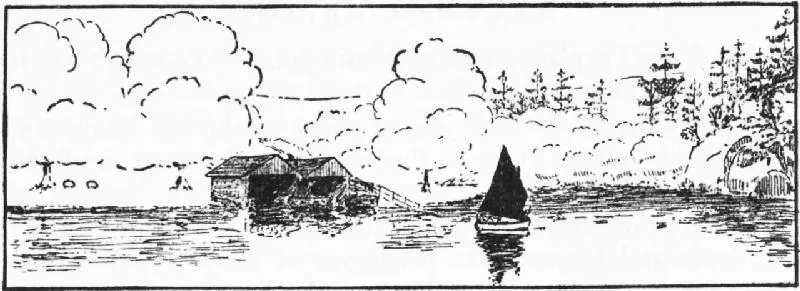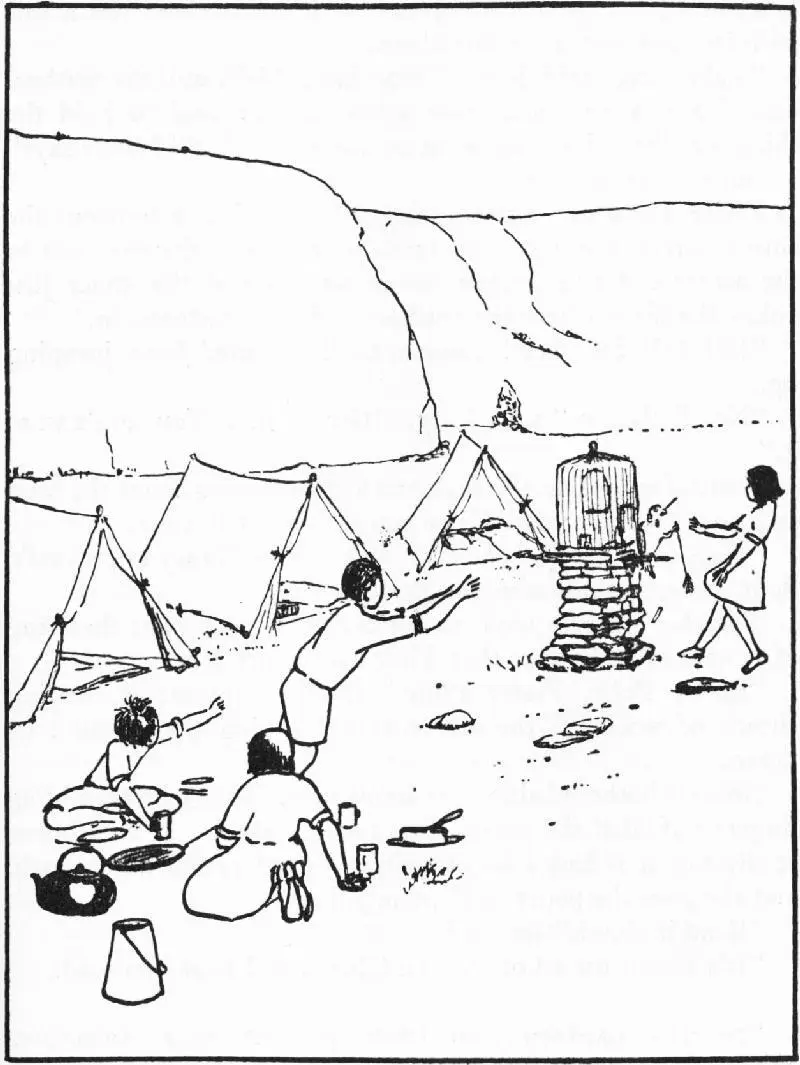“The thing that’s so funny about it,” said John, “is that Nancy did it as if it really mattered.”
“Perhaps it does,” said Titty, “and we can’t see how. I wish Captain Nancy wasn’t so awfully clever.”
“She isn’t cleverer than John,” said Roger.
John said nothing. “Show the parrot his feathers.” It did not seem to him to mean anything at all.
At last Roger reminded them that Susan had said supper was to be early, and, after giving one more rub down to the mast, the captain, the able-seaman, and the boy set off on their way back to Swallowdale. There were the four trout to think of, as well as Susan. Roger at least was not likely to forget them, though the others might. They hurried up the side of the beck, crossed by the road instead of under the bridge, and climbed the steep woods to the moor, carrying the arrow with them.
Chapter XXI.
Showing the Parrot His Feathers
Table of Contents

They found the mate in a very native mood, due to the cleaning and cooking of the four trout. Fried trout ought to be eaten the moment they are cooked. You can’t go on hotting them up for people. If you keep them frying too long they dry up and you might as well throw them away. It was enough to turn anybody native to have cleaned them and salted them and got the fire just right and the butter melted in the frying-pan and the four little trout sizzling noisily as if in a hurry to be eaten, and then not a sign of the crew in spite of all the trouble taken. Susan had made the frying spread out as long as she possibly could, and really it was a little too much when the others came up into Swallowdale at least twenty minutes after the trout were at their best, and Roger sniffing the good smell of them said, very happily, “Just in time.”
“You aren’t,” said Susan. “You ought to have been here half an hour ago. I told you to come back straight away. Another time you’d better cook your own fish and I’ll be the one to play round and to come back ‘just in time.’ ”
Roger was going to say that perhaps there wouldn’t be any fish left if she did that, when he caught John’s eye, and saw that the captain thought it would be just as well to take no risks with the mate.
“I’ve seen the Amazons,” said John.
“They’re not coming to supper are they?” said the mate. “We’ve only got the four fish.”
“I didn’t see them to talk to,” said John. “They were in the launch. Nancy shot an arrow at the point by the Pike Rock. An arrow with a message on it.”
“It’s all right about the great-aunt,” said Titty. “John saw her.”
“Let’s get supper done,” said the mate.
“We’ve got the arrow,” said Roger. “Here it is.”
“That’s your bit of bread and butter,” said the mate.
“These are jolly good fish,” said John. “They couldn’t be better cooked. They’re better even than the ones we had the day we went fishing with Captain Flint.”
After that for some time nobody talked of anything but the trout and the supper. Titty and Roger told how the trout had been caught, one in the bathing-pool and the other three in the small pools between the top of Swallowdale and Trout Tarn. Roger told of the bigger ones there would have been if only they had not dropped off. Everybody said how good they were to eat. When the bones of the last trout had been emptied into the camp-fire, Susan showed them just how lucky they were to have so good a cook as mate to the expedition. She had baked four apples to go with the rice pudding, burying them in a biscuit tin under the hot ashes. They liked their supper so much that when it was over Susan herself brought the talk back to the arrow. She had no sooner mentioned it than Roger handed it across to her and everybody began to talk at once of the launch and of the shooting of the arrow which John alone had seen.
“It had a message fastened to it,” said John, “but it doesn’t seem to mean much. . . . ‘Show the parrot his feathers.’ . . . Look at it.” He gave the mate the little curled slip of paper.
She unrolled it and looked at it.
“It doesn’t look as if it meant anything at all,” she said.
“But when Nancy shot the arrow, she hid behind the cabin and looked as if it was something that mattered very much.”
“It isn’t like the arrows they had last year,” said Roger. “It isn’t shiny.”
This was true. The arrow they were looking at in the camp was very rough, as if it had been made in a hurry. It was blunt at the end and the wood had never been varnished.
“I suppose those are the parrot’s feathers,” said Susan.
“Yes,” said Titty. “This one is the first that came out after we went home last year. I’d been saving it ever since the winter. I know it because it got snipped in the scissors by mistake. The other one came out just before we came here. They were both in the lot I gave Nancy when they came to the island the day Roger and I discovered Swallowdale.”
“So it must be a new arrow.”
“It looks as if they’d only just made it,” said John, “with nobody to help.”
“Let’s do just what the message says,” said Titty.
“What?”
“Show the feathers to Polly. He’s awfully clever.”
“He isn’t as clever as all that,” said John. “If we don’t know what it all means, he won’t.”
“Anyhow, let’s do what Nancy said. She’ll probably ask whether we did it or not.”
Titty took the arrow with the green feathers and walked across with it to the ship’s parrot, who was on his perch making the most of the evening sunshine.
 “HI! HI! STOP HIM!”
“HI! HI! STOP HIM!”
Instantly the parrot screamed aloud and seized the arrow with its beak and one of its claws.
“Take care,” said John. “Stop him. He’ll pull the feathers out. There’s only a narrow splice at each end to hold the thing together. He’ll smash it up and then what’ll Nancy say?”
But he was too late.
There was a noise of splitting wood, and in a moment the ship’s parrot had not only torn his own old feathers out of the arrow but had broken the arrow itself at the splice just below the place where the feathers had been fastened in.
“Hi! Hi! Stop him! Look at that!” shouted John, jumping up.
“No, Polly, no,” said Titty. “Give it me. You don’t want it.”
Something beside the feathers had been torn from the split and now broken arrow. Titty rescued it just in time.
“Well done, Polly,” she said. “Of course Nancy knew you’d do it, because she’s seen you do it before.”
The ship’s parrot took no notice. It did not want the scrap of closely folded paper that Titty had in her hand.
“Pretty Polly, Pretty Polly,” it said contentedly, tearing shreds of wood off the arrow and dropping them round its perch.
Nobody bothered about the arrow now. Titty with trembling fingers unfolded the paper. She saw the skull and crossbones at the top of it and a lot of writing in red pencil underneath, and she gave the paper to Captain John.
“Read it aloud,” she said.
“It’s meant for all of us,” said John, and began to read.
“TO THE CAPTAIN AND CREW OF THE SHIP ‘SWALLOW.’ GREETING. FROM FELLOW MARINERS IN SORE DISTRESS. WE ARE NOT SUPPOSED TO GO ANYWHERE OUT OF SIGHT OF THE NATIVES. THE GREAT-AUNT LIKES TO SEE US ALL THE TIME. WE WERE LATE THAT DAY WE KNEW WE WOULD BE AND WE ARE LIVING IT DOWN. BUT CLOUDS HAVE SILVER LININGS (THIS IS A QUOTATION) AND EVEN LESSONBOOKS HAVE LAST PAGES. IT’S NEARLY OVER NOW. IMPORTANT. START EARLY TO-MORROW BY THE WAY WE CAME. KEEP ON THE TOP OF THE MOOR HEADING DUE NORTH UNTIL YOU SEE FOUR FIRS IN WHAT USED TO BE A WOOD. FOLLOW THE WAY THEY POINT AND KEEP TO THE STONE WALL TILL YOU COME TO THE ROAD. THE RIVER IS TWO FIELDS AWAY ON THE OTHER SIDE OF THE ROAD. LOOK FOR A STONE BARN. ABOUT A CABLE’S LENGTH ABOVE THE BARN IS AN OAK TREE CLOSE TO THE RIVER. HERE YOU WILL FIND A NATIVE WAR CANOE. BECKFOOT IS THE NAME ON ITS TRANSOM. . . .”
Читать дальше


 “HI! HI! STOP HIM!”
“HI! HI! STOP HIM!”










